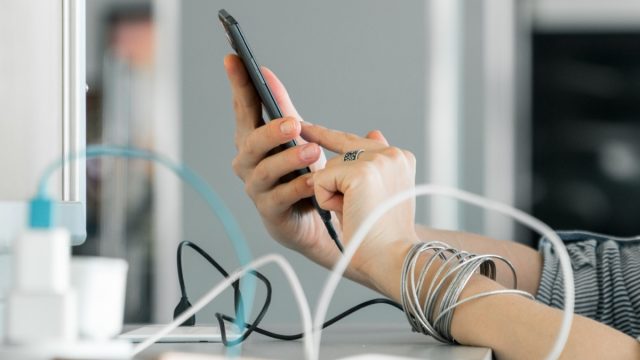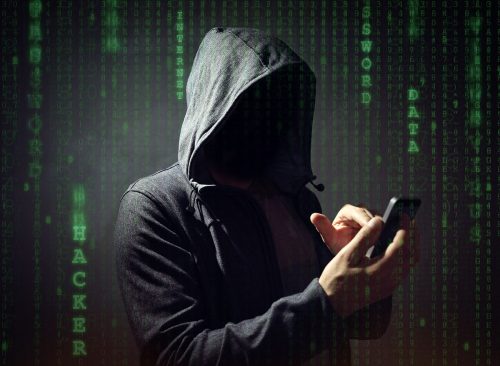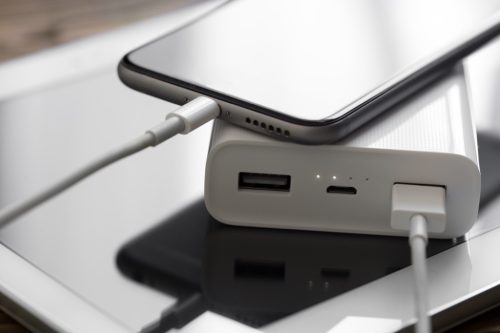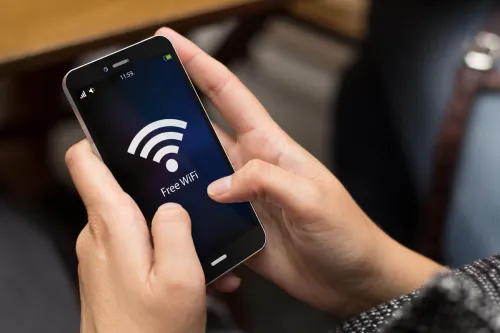FBI Says Never Use Free Phone Charging Stations in New Warning
You could be putting your sensitive information at risk.

While out and about, we tend to run our batteries low with constant texts, phone calls, and app use—and unless you've remembered to grab a mobile charger, you're out of luck if your phone dies. Some airports and travel hubs offer a solution in the form of free charging stations, which conveniently help you power up on the go. But according to the Federal Bureau of Investigation (FBI), you should avoid these apparent amenities at all costs. Read on to find out why the agency warns you should never use free phone charging stations.
READ THIS NEXT: If You Get a Call From These Numbers, "Don't Believe Your Caller ID," FBI Says in New Warning.
Criminals are taking advantage of charging stations.
On April 6, the FBI field office in Denver tweeted about public charging stations, warning that your phone could be a target for criminals.
"Avoid using free charging stations in airports, hotels or shopping centers," the tweet reads. "Bad actors have figured out ways to use public USB ports to introduce malware and monitoring software onto devices. Carry your own charger and USB cord and use an electrical outlet instead."
In a statement to Best Life, a spokesperson for the Denver office confirmed that nothing prompted the tweet, which was issued as a standard public service announcement (PSA).
The FBI isn't the only entity to warn about charging stations.

The Federal Communications Commission (FCC) also warns against charging stations, and even has a formal name for the introduction of malware: "juice jacking."
"If your battery is running low, be aware that juicing up your electronic device at free USB port charging stations, such as those found near airport gates, in hotels and other travel-friendly locations, could have unfortunate consequences," a page on the FCC website reads. "You could become a victim of 'juice jacking,' a new cyber-theft tactic."
According to the FCC, once malware is introduced onto your phone, it can then "lock a device or expert personal data and passwords directly to the perpetrator."
RELATED: For more up-to-date information, sign up for our daily newsletter.
You have a few different on-the-go charging options.

Sometimes, scammers will leave their own cables at charging stations—preying on those who may have forgotten their own cable at home. The FCC also points to a 2019 New York Times article, which asserted that criminals also distribute their USB cables "as promotional gifts."
"You can easily brand these things so you can make it look like any other cable," Liviu Arsene, a cybersecurity expert at Romanian cybersecurity and antivirus software company BitDefender, told the newspaper. "When people see it, they don't really think or expect it to be malicious in any way."
To avoid becoming a target, both the FCC and FBI recommend bringing your own charger to plug into a standard outlet—and the FCC also suggests bringing your car charger along if you'll need one. If you really want to go the extra mile, consider investing in a "charging-only cable" from a reliable supplier. According to the FCC, these cables prevent data from being sent or received while your phone is charging.
Another option is to carry your own portable charger or external battery, avoiding the need to use an outlet at all.
The FBI has additional tips to keep you safe from online criminals.

Further guidance about online safety is posted on the FBI's website, advising everyone to "be cautious when connected."
On its website, the FBI outlines a whole host of best practices and warnings to keep yourself and your devices safe from crooks. In addition to avoiding free charging stations, the agency also recommends being mindful of free WiFi networks.
"Be careful when connecting to a public Wi-Fi network and do not conduct any sensitive transactions, including purchases, when on a public network," the page reads.
In terms of your systems and data, the FBI advises keeping your software up to date and installing antivirus software. Your passwords should always be "strong and unique," as well. If you use the same one for several sites, it puts you more at risk if one account is compromised.





















